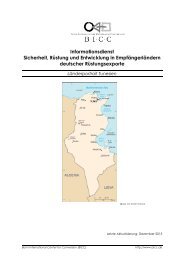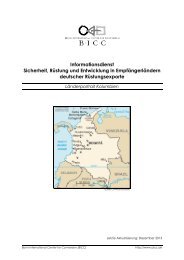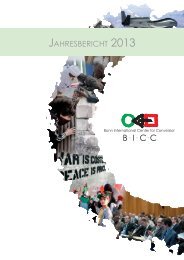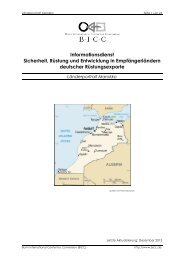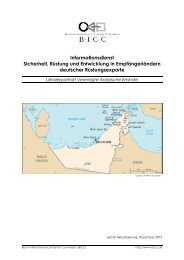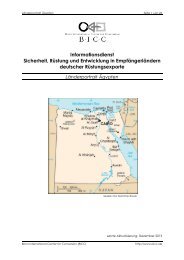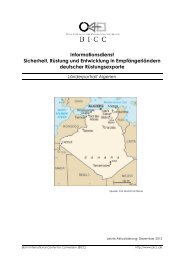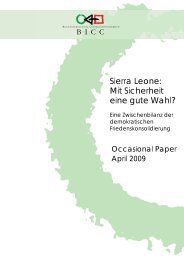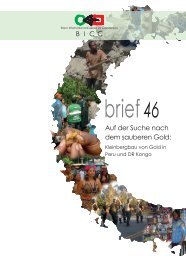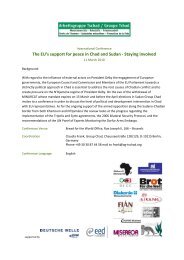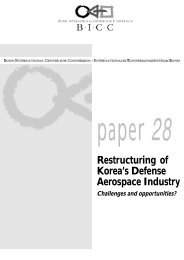English - BICC
English - BICC
English - BICC
Create successful ePaper yourself
Turn your PDF publications into a flip-book with our unique Google optimized e-Paper software.
“The British and Irish Governments reiterate<br />
that the achievement of peace must involve a<br />
permanent end to the use of, or support for,<br />
paramilitary violence. They confirm that, in<br />
these circumstances, democratically mandated<br />
parties which establish a commitment to<br />
exclusively peaceful methods and which have<br />
shown that they abide by the democratic<br />
process, are free to participate fully in<br />
democratic politics and to join in dialogue in<br />
due course between the Governments and the<br />
political parties on the way ahead.”<br />
Dick Spring, the Irish Tanaiste (Deputy<br />
Prime Minister), was quick to put flesh<br />
on the bones of that statement in the<br />
Irish parliament on the very same day<br />
as the Declaration was released. The<br />
Irish government was talking about a<br />
“permanent cessation of violence”<br />
coupled with “the handing up of<br />
arms”; there was to be “no<br />
equivocation” in the two governments’<br />
opposition to any tactical ceasefire<br />
(Irish Times, 16 December 1993). The<br />
direct linkage between disarmament<br />
and fitness to participate in the political<br />
process was beginning to develop. This<br />
view was echoed by John Bruton,<br />
leader of the Fine Gael party and<br />
future Taoiseach, who stressed that any<br />
cessation must be verified by the visible<br />
destruction of weaponry as “people<br />
who retain access to large caches of<br />
arms . . . could hardly be considered<br />
to be normal participants in political<br />
dialogue” (ibid.). Indeed Spring, under<br />
close questioning and just three<br />
months before the IRA ceasefire, went<br />
so far as to say that it was “not<br />
possible” for Sinn Fein to participate in<br />
political dialogue without<br />
demonstrated disarmament by the IRA<br />
(Dail Debates, Irish parliamentary<br />
debates, Vol. 443, Col. 1023, 1 June<br />
1994).<br />
The issue of disarmament was also<br />
highlighted by Paddy O’Brien, the<br />
President of the Association of Garda<br />
Sergeants and Inspectors, who stressed<br />
that paramilitary weaponry could not<br />
remain “out there to be used by future<br />
subversive or criminal groups”<br />
regardless of a ceasefire (Belfast<br />
Newsletter, 30 March 1994).<br />
Decommissioning seemed to be<br />
firming up within the Irish<br />
establishment as a very necessary<br />
indicator of peace months before the<br />
IRA ceasefire was even called. Public<br />
appearances, however, may have<br />
proved deceptive. There was a degree<br />
of nervousness too within the Irish<br />
government about discussion<br />
surrounding the handing over of<br />
armaments and Dermot Nally, the<br />
Secretary to the Government, is<br />
reported to have voiced his concern<br />
that Republicans would “walk away if<br />
we persist with this kind of talk”<br />
(Duignan, no date, p. 136).<br />
The issue was indeed a delicate one<br />
given that the Irish government’s first<br />
priority was to bait the hook<br />
sufficiently so that the Republican<br />
movement could be slowly reeled<br />
towards a ceasefire. Erratic and<br />
premature movements, such as open<br />
discussion of what would happen to<br />
the guns, would simply scare the fish<br />
away. This was the view which<br />
crystallised when the IRA announced<br />
its ceasefire; the question of<br />
disarmament was to soften and be seen<br />
as an evolving part of the process<br />
rather than a verifiable indication of<br />
peaceful intent. Writing in late 1995,<br />
Reynolds felt that Spring’s<br />
interpretation of disarmament was<br />
“too hardline and sweeping to be<br />
sustained” and he declared that by<br />
January 1994 he had come to the<br />
conclusion that it was “impracticable<br />
and unattainable to seek an ‘advance’<br />
gesture” on disarmament. A<br />
disarmament pre-condition would “tip<br />
the delicate balance of the debate in<br />
the IRA against a ceasefire”; what was<br />
achievable was the inclusion of the<br />
question within an evolving process<br />
providing for “a mutual process of<br />
B·I·C·C<br />
origin of the issue<br />
demilitarisation through confidence<br />
building on all sides” (Irish Times, 9<br />
December 1995). Disarmament<br />
remained “essential to the creation of a<br />
totally demilitarised situation and to the<br />
consolidation of peace”, but the Irish<br />
government felt that giving<br />
Republicans “an exam they couldn’t<br />
pass” would only lead to the isolation<br />
of Sinn Fein from the process and the<br />
breakdown of the ceasefire—<br />
something which did not fit the game<br />
plan (Albert Reynolds in Dail Debates,<br />
Vol. 446, Col. 500, 25 October 1994,<br />
quoted in Mallie and McKittrick, 1996,<br />
p. 349).<br />
A card up the sleeve?<br />
The British attitude to<br />
disarmament before<br />
the ceasefire<br />
As previously stated, in the wake of the<br />
ceasefire the British government held<br />
to the view that substantive<br />
negotiations with Sinn Fein could only<br />
occur with prior decommissioning of<br />
weaponry. The British government was<br />
to constantly reiterate that this had<br />
always been their outlook, whilst<br />
Republicans have always insisted that it<br />
was a belated pre-condition, but a<br />
careful tracking of public (and private)<br />
statements emanating from the British<br />
government leads to a more nuanced<br />
view. Sir Patrick Mayhew, the Secretary<br />
of State for Northern Ireland, first<br />
flagged the issue of disarmament in<br />
October 1993, when he confirmed that<br />
any IRA cessation would need to be<br />
accompanied by a weapons handover<br />
and stated that “nobody would be<br />
impressed unless there was some<br />
practical action taken to demonstrate<br />
that violence was over” (Irish Times, 11<br />
October 1993).<br />
There is no doubt that Sinn Fein were<br />
fully aware of the flagging of this issue<br />
by Mayhew and the wider British<br />
government, even after the publication<br />
of the Joint Declaration which made<br />
no explicit reference to disarmament.<br />
Gerry Adams voiced his concerns<br />
forthrightly, in January 1994:<br />
11



